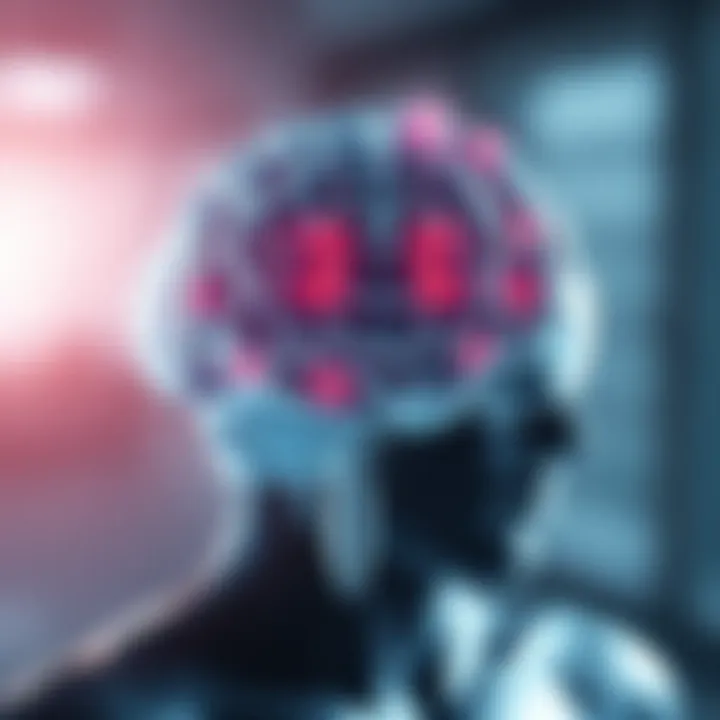Effective Strategies to Boost Memory and Concentration


Intro
In our fast-paced world, where multitasking has become a daily norm, the significance of memory and focus cannot be understated. These cognitive abilities are not merely tools for success in professional and academic settings, but they also play a crucial role in how we engage with our daily lives and relationships. Understanding the strategies to enhance these skills is akin to possessing a toolkit equipped for growth and better functioning.
While many focus on physical health for productivity, mental well-being serves as the foundation that supports effective memory and concentration. The interconnection of mental fitness and cognitive performance presents numerous opportunities for individual development. In this article, we explore the intricacies of mental health, practical strategies for improvement, and actionable insights that can lead to a more balanced and efficient life.
Understanding Mental Health and Well-being
What is Mental Health?
Mental health encompasses our emotional, psychological, and social well-being. It influences how we think, feel, and act. A sound mental state enables individuals to cope with stress, relate to others, and make decisions. Just as one may visit a doctor for a physical ailment, one’s mental condition requires attention and care. High levels of anxiety, depression, or persistent worry might hinder cognitive function, making it vital for people to recognize and address these issues.
The Importance of Prioritizing Mental Well-being
Prioritizing mental well-being lays the groundwork for a fulfilling life. When individuals pay attention to their mental health, they enhance their functioning in various facets, whether it be personal aspirations or professional endeavors. A study reported by the World Health Organization (WHO) suggests that environments fostering mental well-being can lead to higher productivity and satisfaction in individuals, promoting a harmonious existence both personally and professionally.
Common Mental Health Challenges and Disorders
Many face mental health challenges, ranging from mild anxiety to severe depression. The ability to recognize these challenges is the first step towards improvement.
- Anxiety Disorders: Characterized by excessive worry or fear.
- Depression: Affects mood, energy, and cognitive function.
- Attention-Deficit/Hyperactivity Disorder (ADHD): Impairs concentration and focus.
Often, these disorders can inhibit memory and focus, making it essential to address them head-on.
"Mental health is not a destination, but a process. It's about how you drive, not where you're going."
Understanding and improving mental well-being involves more than just occasional self-care. It encompasses a holistic approach to daily life that integrates various practices aimed at fostering resilience and clarity.
Understanding Memory and Focus
Grasping the concepts of memory and focus is foundational for anyone keen on enhancing their cognitive abilities. Memory, as we comprehend it, is not merely the ability to recall information—it is a complex process that involves encoding, storing, and retrieving data. This intricacy underscores the strength of our memories; they shape our identities, influence our decision-making, and determine how we interact with the world around us. Enhancing memory can lead to improved learning outcomes and a deeper understanding of our experiences, which is particularly crucial for students, professionals, and lifelong learners.
Focus, on the other hand, can be seen as the mental spotlight that illuminates a particular task while dimming distractions. In our hyper-connected age, characterized by multitasking and constant notifications, cultivating the ability to concentrate constitutes a formidable challenge. Enhancing focus not only impacts productivity but also affects how effectively one can engage with material intended for retention. Think of it like tuning a radio dial; when the frequency is just right, the sound is clear and vibrant.
Moreover, the intricate relationship between memory and focus merits attention. Without focus, the encoding of memories can falter; conversely, without memories, our focus can be meaningless, devoid of context and significance. Understanding this interplay is pivotal for developing effective strategies tailored to augment both cognitive functions.
In this article, we will dissect these elements, explore their impact on overall mental health, and share actionable strategies to bolster your memory and focus. Unpacking this phenomenon provides invaluable insights and techniques that readers can incorporate into their daily lives.
"Memory is the treasure house of the mind wherein the monuments thereof are kept and preserved."
— Thomas Fuller
This fascinating dance between memory and attention opens up a world of possibilities, leading to improved learning, better decision-making, and enriched experiences. So, buckle up as we embark on this journey to unravel and enhance our cognitive faculties.
The Role of Nutrition
Nutrition plays a pivotal part in our cognitive functioning and overall brain health. What we feed our bodies can significantly influence our memory and focus, two critical components of our mental capacity. In exploring the ways that nourishment affects our cognitive abilities, we see how certain nutrients can enhance our mental performance and protect against cognitive decline. Let’s delve deeper into the essential nutrients that fuel our brains and discover which foods can supercharge our cognitive capabilities.
Essential Nutrients for Brain Function
Omega-3 Fatty Acids
Omega-3 fatty acids are renowned for their crucial role in brain health. These fats are integral components of cell membranes in the brain. A notable aspect of omega-3 is its anti-inflammatory properties, which help shield the brain from damage and reduce the risk of cognitive decline.
The benefits of incorporating omega-3 into one’s diet are well documented. Found in fatty fish like salmon, sardines, and mackerel, these acids are not only good for the heart but also for the mind. Research suggests a strong link between omega-3 intake and improved memory function, alongside a reduction in symptoms of mood disorders. The unique feature of omega-3 fatty acids is their ability to support neural plasticity, the brain's capacity to adapt and change. On the downside, sourcing high-quality omega-3 can be a challenge for some, particularly those not accustomed to eating fish.
Antioxidants
Antioxidants are another category of beneficial nutrients that can have a profound impact on cognitive function. They combat oxidative stress, which can lead to cell damage and accelerate aging in the brain. Fruits and vegetables that are vibrant in color, like berries, dark chocolate, and leafy greens, are packed with antioxidants.
One key characteristic of antioxidants is their ability to enhance blood flow to the brain, ensuring that it receives the oxygen and nutrients it craves. This can lead to sharper concentration and improved memory retention. However, while the advantages of antioxidants are clear, the challenge lies in obtaining them in sufficient quantities daily, especially for individuals who may not consume a variety of fruits and vegetables regularly.
B Vitamins
B Vitamins, particularly B6, B9 (folate), and B12, are essential for maintaining optimal brain function. These vitamins are crucial for energy metabolism, neurotransmitter synthesis, and DNA repair processes. A defining characteristic of B Vitamins is their involvement in mood regulation and cognitive clarity.
These vitamins can be found in foods like whole grains, legumes, eggs, and leafy greens. Their unique feature lies in their interdependence; for example, a deficiency in one can adversely affect the others. This interconnectedness means a balanced diet is necessary to reap the full benefits of B Vitamins. A downside to note is that many individuals may not obtain enough B Vitamins from diet alone, particularly older adults with specific dietary restrictions.
Foods That Boost Cognitive Abilities
A diet rich in nutrients that support cognitive function is key to maintaining mental agility. Here are some standout foods that can help to sharpen your mind:
- Fatty Fish: As already covered, rich in omega-3s.
- Berries: High in antioxidants, great for memory support.
- Turmeric: Contains curcumin, beneficial for memory and mood.
- Broccoli: Full of antioxidants, fiber, and vitamin K.
- Pumpkin Seeds: A rich source of magnesium, iron, zinc, and copper, boasting cognitive benefits.
Incorporating a variety of these foods into your daily diet can lead to notable improvements in cognitive function. Each component plays a role, creating a balanced and effective strategy for enhancing brain health and, subsequently, focus and memory.
The Impact of Physical Health


Physical health plays a pivotal role in enhancing cognitive abilities such as memory and focus. It’s not just about going to the gym or eating your greens; there’s a whole world of interconnected benefits that come into play when we take care of our bodies. By focusing on physical well-being, one inevitably nurtures the mind. Let’s explore how exercise and sleep contribute to this vital aspect of mental performance.
Exercise and Brain Function
When it comes to boosting brain function, exercise might just be the secret sauce. Engaging in regular physical activity can pump up blood flow to the brain, which helps carry oxygen and nutrients essential for optimal functioning. Moreover, exercise has been shown to stimulate the production of neurotrophic factors, substances that support the growth and survival of neurons.
Research indicates that aerobic exercises, such as running or swimming, can lead to improvements in various cognitive functions, including memory retention. Engaging in such activities gets the heart rate up, which translates to better mental clarity and sharpened concentration.
- Key benefits of exercise include:
- Enhancing neuroplasticity, which is crucial for learning.
- Reducing symptoms of anxiety and depression that could cloud focus.
- Improving sleep quality, thereby facilitating memory consolidation.
To sum it up, incorporating movement into your daily routine doesn’t just sculpt your physique; it shapes your cognitive landscape too. Start small—perhaps a brisk walk or a quick workout—then gradually increase to reap the full rewards.
Sleep's Influence on Memory and Focus
Now let’s tackle sleep, an often underrated hero in the quest for better memory and attentiveness. Quite simply, sleep is essential for consolidating memories formed throughout the day. During deep sleep, the brain actively processes newly acquired information, strengthening neural connections relevant to what we’ve learned.
A lack of adequate sleep can lead to muddied thoughts, forgetfulness, and decreased overall cognitive ability. Those who prioritize a consistent sleep schedule often find themselves experiencing sharper focus and improved recall. Aim for 7 to 9 hours of quality sleep per night to truly allow your brain to recharge.
- Consider these aspects of sleep:
- Sleep Duration: Insufficient sleep can hinder memory retention and focus.
- Sleep Quality: Disturbances such as sleep apnea can fragment sleep, rendering it less restorative.
- Sleep Environment: A dark, cool, quiet room promotes better sleep quality.
"Sleep is the best meditation." - Dalai Lama
In essence, good sleep hygiene is crucial for mental acuity. By adopting healthy sleep habits, you can enhance not just your memory but your entire cognitive function.
By understanding the profound connection between physical health, exercise, and sleep, individuals can take actionable steps to bolster their memory and focus, nurturing their minds along with their bodies.
Mental Exercises for Cognitive Enhancement
Cognitive enhancement is not reserved for just the realm of pharmacology or advanced tech. Back in the day, the proverbial saying, "use it or lose it," had merit, especially when we talk about memory and focus. Mental exercises serve as a workout for the brain. By engaging in these activities, individuals sharpen their cognitive abilities, ultimately leading to improved memory retention and heightened focus. The significance of incorporating mental exercises into daily life cannot be overstated; they are a vital component in the pursuit of a sharper mind and improved mental health.
Lo and behold, the benefits are manifold. Not only do these exercises bolster memory, but they also foster creativity and enhance critical thinking. Consider this: when you challenge your brain with varied tasks, you create new neural connections. This phenomenon, referred to as neuroplasticity, illustrates how adaptable the brain can be, adjusting and growing stronger in response to varied experiences.
It's important, however, to keep the exercises diverse and engaging. Sticking to just one or two types can render the brain complacent. Mixing things up, much like one does with exercise routines for physical fitness, is crucial. It keeps the mind alert and engaged. Let's dive deeper into some specific exercises that have proven to be effective.
Memory Games and Puzzles
Memory games are perhaps the most accessible way to enhance cognitive function. Engaging in tasks like matching cards or participating in apps designed specifically for memory enhancement provides not just entertainment but also a mental workout. A great example is the classic game of Concentration, where players must remember and match pairs of cards. Not only does this exercise require focus and memory, but it can also serve as a fun way to socialize with family or friends.
Puzzles, on the other hand, stretch various cognitive muscles. From jigsaw puzzles that encourage spatial reasoning to word searches that bolster vocabulary retention, these activities require sustained focus and strategic thinking. They often compel individuals to step back and figure out the bigger picture, which, metaphorically speaking, might just be a hidden lesson in life.
"Memory games and puzzles are not only beneficial for individual practice but can also foster a sense of community when shared with others."
The Power of Reading and Learning
Reading is a timeless exercise that stimulates the mind. It exposes individuals to new ideas, histories, and cultures, offering a cognitive cocktail of engagement. Whether diving into a novel or exploring academic journals, reading sharpens focus and enhances comprehension. In the modern world, digital media often drowns out the written word, yet dedicating just a little bit each day can lead to substantial cognitive improvements.
Moreover, lifelong learning is crucial. Engaging in courses—whether online or in person—drives this point home. Every new skill learned, be it a language or a musical instrument, serves as a workout for your brain that’s as essential as any physical routine. By challenging oneself to learn new concepts or skills, one actively carves out pathways in the brain that enhance overall cognitive function.
Mind Mapping Techniques
Mind mapping is an innovative strategy for visually organizing information. This technique allows individuals to outline thoughts, relationships, and ideas in a manner that may be less linear and more intuitive. At its core, mind mapping engages the brain in creative problem-solving, enhancing both memory retention and focus.
To create a mind map, one begins with a central idea and branches out into subcategories. This diagrammatic representation not only makes recalling information easier but also highlights connections that may not be immediately evident. Over time, individuals may find such a technique invaluable for both personal and professional applications, whether brainstorming for a project or organizing thoughts for an event.
Much like a garden in full bloom, a well-structured mind map can transform chaotic thoughts into a coherent visual story, promoting clarity and comprehension.
Mindfulness and Its Benefits
In our fast-paced world, the ability to maintain focus and bolster memory has become essential. Mindfulness stands out as a potent tool that enhances cognitive functions by anchoring our attention to the present moment. By cultivating mindfulness, individuals can experience profound benefits that reach far and wide—improved concentration, heightened awareness, and a reduction in stress levels. Understanding how mindfulness dovetails with memory and focus provides critical insight for anyone looking to optimize their mental clarity.
Meditation for Enhancing Focus
Meditation serves as a cornerstone of mindfulness practice. When practised regularly, it trains the mind to maintain sustained attention and reduce distractions. Think of meditation as a mental gym where one can grow their focus strength.
- Types of Meditation:
- Benefits of Meditation for Focus:
- Mindfulness Meditation: encourages awareness of thoughts and feelings without judgment.
- Concentration Meditation: focuses on a single point, such as breathing or a specific phrase, sharpening the mind's ability to concentrate.
- Enhances attention span: Research indicates that individuals who meditate tend to outperform non-meditators on attention-related tasks.
- Reduces mind-wandering: Regular meditation can minimize the tendency of the mind to flit from one thought to another, which is a common barrier to focus.
A study reported in the Journal of Cognitive Enhancement indicated that participants who engaged in daily meditation showed significant improvement in both memory recall and attention tasks, emphasizing meditation's pivotal role in cognitive enhancement. For those wanting to improve their focus, adopting even a few minutes of meditation daily can create noticeable changes over time.
Breathing Techniques for Improved Concentration


Breathing techniques are another fundamental aspect of mindfulness, possessing the capacity to recalibrate one’s focus instantly. Controlled breathing not only calms the nervous system but also improves oxygen flow to the brain, which is vital for cognitive prowess.
- Deep Breathing: Involves inhaling deeply through the nose, holding, and exhaling through the mouth. This method can activate the body’s relaxation response, which is quite helpful in high-stress situations when concentration is paramount.
- Alternate Nostril Breathing: This technique involves closing off one nostril while inhaling and then switching nostrils. Many practitioners claim it balances the brain hemispheres, leading to improved mental clarity and focus.
To summarize, integrating breathing exercises can serve as a quick and effective way to center oneself amidst chaos, further solidifying the link between mindfulness and cognitive enhancement.
"Mindfulness is the practice of cultivating a heightened awareness of the present moment, enriching our ability to focus and commit experiences to memory, ultimately leading to a more balanced life."
Conclusively, the interwoven practices of meditation and breathing techniques can create a robust defense against distractions, enabling individuals to sharpen their minds. Incorporating such practices into daily routines not only enhances focus but also fosters a profound connection between the mind and body, nurturing overall mental health.
Managing Stress to Boost Cognitive Function
Managing stress is crucial in enhancing memory and focus. Stress has a way of clouding our minds and overwhelming our thinking capabilities. When a person experiences stress, the body goes into fight-or-flight mode, releasing a surge of hormones like adrenaline and cortisol. While these hormones can be beneficial in short bursts, chronic stress can lead to cognitive decline, impacting memory retention and focus. By recognizing stress triggers and employing effective coping strategies, individuals can improve cognitive function significantly.
Recognizing Stress Triggers
Understanding what causes stress in our lives is the first step towards managing it. Stress triggers can be both external and internal. For example, external triggers could involve deadlines at work, family responsibilities, or financial worries. Internal triggers might include negative self-talk or unrealistic expectations we put on ourselves.
To effectively manage stress, it's essential to identify these triggers and how they manifest in daily life. Here are some common stress triggers to watch for:
- Work-related pressures: Ongoing projects, tight deadlines, and job insecurity can weigh heavily on the mind.
- Interpersonal conflicts: Disagreements with friends, family, or colleagues can create a mental strain.
- Health concerns: Worrying about one’s health or the health of loved ones can ignite feelings of anxiety.
- Life changes: Major life events, whether positive or negative, such as moving or changing jobs, can be significant triggers.
Recognizing how stress affects you personally may involve keeping a journal. Write down when you feel stressed, what you were doing, and the events leading up to these feelings. Over time, patterns will emerge, allowing for greater awareness of personal stressors.
Coping Strategies for Stress Reduction
Once you've identified stress triggers, the next step is to develop effective coping strategies. Here are some practical ideas that may work:
- Mindfulness and Meditation: Practicing meditation can ground you, helping to clear the mind and reduce anxiety. Even five minutes a day can make a difference.
- Physical Activity: Exercise is a powerful stress reliever. Whether it’s a quick walk around the block or a more rigorous workout, getting the blood pumping can help elevate mood and cognitive abilities.
- Effective Time Management: Planning your day with realistic goals can alleviate the pressure of looming deadlines. Use tools like calendars or scheduling apps to break down tasks into manageable portions.
- Deep Breathing Techniques: Taking a moment to breathe deeply can activate the body’s relaxation response. Inhale slowly through the nose, hold for a few seconds, and exhale slowly through the mouth.
- Talking it Out: Engaging in conversations with a trusted friend or therapist can provide an outlet for stress and help gain perspective on challenges.
- Healthy Lifestyle Choices: Maintaining a balanced diet, getting enough sleep, and avoiding excessive caffeine or alcohol can keep stress levels in check.
"Stress doesn’t just impact our emotional health; it can affect memory and focus as well. Knowing your stress triggers and having strategies at hand can change the game."
Incorporating these strategies on a regular basis can nurture a calmer, more focused mind. Ultimately, by managing stress, one can unlock improved memory and cognitive performance, fostering an environment conducive for learning and growth.
Creating an Optimal Learning Environment
Creating an optimal learning environment is fundamental for enhancing memory and focus. It sets the stage for how effectively information is absorbed and retained. When discussing this topic, it’s crucial to consider several elements that contribute to the quality of the learning atmosphere. This is relevant because a well-structured learning space can significantly alter a person’s cognitive capabilities, making it easier to stay engaged and motivated.
The benefits of a carefully curated environment go beyond simply being organized. Elements such as lighting, noise levels, and the arrangement of materials can either nurture or hinder mental clarity. Here are some specific considerations that can enhance your environment:
- Lighting: Natural light is optimal for prolonged focus. It reduces eye strain and can improve mood. Artificial light should mimic natural daylight to keep energy levels up.
- Noise Levels: While some thrive in silence, others may require a bit of background noise. Finding what works best for you is essential. Some might use instrumental music or white noise to aid concentration.
- Arrangement: An organized space helps streamline thought processes. Too much clutter can cause distraction. It’s beneficial to have a designated area for studying or working.
"A tidy space fosters a tidy mind; before you know it, ideas can flow like a rivers through your veins."
All these factors come together to shape how effectively one can retain information and focus on tasks. Each detail counts. When designing your space, remember that it should support goals rather than detract from them.
Decluttering Your Space
Decluttering your space is often the first step toward improving memory and focus. A clean workspace can drastically enhance cognitive performance. Think of it like this: when you walk into a room filled with clutter, it’s like stepping into a fog. This clutter can create mental noise that interferes with your ability to think clearly.
Steps to declutter include:
- Remove Unused Items: Look at your desk and ask if each item is necessary. If it's just taking up space, it’s time for it to go.
- Organize by Category: Keep similar items together. For instance, have a section for books, another for stationery. This will save time when you need to locate something.
- Limit Personal Items: While personal touches can make a space feel comfortable, too many can also be distracting. Pick a couple of items that inspire you, but avoid overcrowding.
- Daily Maintenance: Make it a habit to do a quick tidying up each day. This will prevent clutter from accumulating.
By implementing these strategies, you not only clear your physical space but also create a mental one that’s conducive to learning.
Utilizing Technology Mindfully
In this digital age, technology can be a double-edged sword. While it provides tools that can enhance learning, it also has the potential to distract.
Mindful use of technology means leveraging it in a way that promotes focus instead of detracts from it. Here are key strategies:
- Limit Notifications: Constant alerts disrupt concentration. Setting your device to ‘Do Not Disturb’ mode while studying can help maintain focus.
- Use Educational Apps: Certain applications focus on enhancing memory retention and concentration. Apps like Anki and Quizlet use spaced repetition, a technique proven to improve memorization.
- Time Management Tools: Utilizing apps like Trello or Todoist can help organize tasks and allocate time effectively. A structured plan allows you to break down tasks and engage with them systematically.
- Set Boundaries for Social Media: Social media can be a major source of distraction. Setting specific times when you check social media can free up valuable time for focused learning.
In sum, technology offers vast potential as a learning aide, but it works best when used consciously. Finding a balance will help create a harmonious learning space that enhances memory and focus.
The Importance of Routine
A well-defined routine can serve as the backbone of enhancing memory and focus. When life becomes a jumble of tasks and distractions, establishing consistency helps anchor your mental processes. A good routine creates a predictable environment which, in turn, benefits cognitive functions by reducing mental clutter. Think of it like a rehearsal before the big show; every step matters and, when practiced, leads to peak performance.
One major benefit of having a routine is the improved reliability of memory retention. When activities are scheduled consistently, the brain forms stronger connections related to those tasks. It’s akin to grooves on a record; the more often a song plays, the deeper the grooves become, making it easier for the needle to read the music. By repeating tasks, you not only reinforce the information but also make the retrieval process smoother.
However, one must consider that not every routine is beneficial. A monotonous daily schedule can lead to cognitive fatigue. The key is to find a balance between structure and flexibility, allowing your brain to engage without feeling trapped. Here are a few crucial elements to consider when establishing a routine:
- Consistency: Sticking to the same wake-up and sleep times can help regulate your internal clock, contributing to better focus throughout the day.
- Task Prioritization: Begin each day with a clear list of what needs to be accomplished. Prioritizing tasks not only makes you more efficient but also reduces the feeling of being overwhelmed.
- Scheduled Breaks: Incorporating short breaks gives your brain a breather and aids in retaining information. A 5 to 10-minute break every hour can considerably improve long-term focus.


A structured routine is more than just a schedule; it’s a systematic approach to managing how you utilize your cognitive resources.
Establishing a routine means embracing a lifestyle that inherently respects your cognitive abilities. Remember, it can take time for habits to sink in. Allow yourself patience. Gradually, you’ll notice improvements in memory retention and focus as your brain adapts to its new rhythm.
Building Daily Habits for Memory Improvement
Daily habits aren’t mere rattling chains; they are the framework within which your memory thrives. Developing memory-enhancing activities shouldn’t feel like an arduous chore. Instead, think of them as fun brain workouts that stimulate mental agility. Here are some practices to consider when building those habits:
- Daily Review: Spend time at the end of each day reviewing what you’ve learned or experienced. This helps solidify the information in your long-term memory.
- Consistent Learning: Incorporate a new skill or subject into your daily routine. Whether it’s language learning or mastering a musical instrument, frequent practice enhances neural connections.
- Utilize Mnemonic Devices: Make use of acronyms, visualization, or even rhymes to aid memory retention. These tools help transition information from short-term to long-term memory.
Structure and Its Effect on Focus
The structure in your daily routine isn’t just about being disciplined; it also has a profound impact on your ability to focus. When tasks are organized, your brain can process information without constant distraction. A clearly laid out framework creates a cognition-friendly environment, promoting deeper engagement with the materials at hand.
- Physical Space: The organization of your physical workspace matters. An orderly desk leads to a clearer mind where focus can thrive, allowing you to dive deep into tasks without unnecessary interruptions.
- Time Blocks: Allocate specific time frames for various activities. For instance, slotting in a dedicated hour for reading can solidify focus. This discipline builds momentum and diminishes procrastination.
- Limit Distractions: Identify and limit distractions within your structured schedule. Whether it’s phone notifications or a chaotic environment, removing these barriers makes focus easier.
The route of focus is often paved with habits and structure. Like a well-tended garden, it requires regular care and attention. By establishing a routine that prioritizes memory and focus techniques, you’re not just creating a schedule; you’re shaping a future where your mental capabilities can flourish.
Utilizing Cognitive Tools
In today's fast-paced world, maximizing memory and focus is crucial. Utilising cognitive tools can be the game changer for many individuals, especially those who juggle multiple tasks and responsibilities. These tools can serve not just as aids but as structural supports for the brain’s performance. When individuals lean on technology and organized techniques, they empower themselves to work smarter, rather than harder, leading to higher productivity and sharper cognition.
Apps and Software for Memory Retention
In a digital age, there is no shortage of applications and software aimed at enhancing memory retention. These tools provide a range of options to engage users in interactive and effective ways. Popular applications like Anki and Memrise utilize spaced repetition algorithms to help solidify learning by revisiting information at optimal intervals, making long-term retention far more achievable.
Other notable mentions include:
- Evernote: A robust note-taking app that lets you categorize thoughts, ideas, and lists, enhancing the ease of retrieval during study sessions or work.
- Todoist: This task manager aids in organizing tasks efficiently while reminding you of deadlines, preventing cognitive overload.
The beauty of using these tools lies in their versatility; they cater to different learning styles. For instance, visual learners may benefit from apps with engaging visuals, while auditory learners might find podcasts and audio notes helpful.
Despite their benefits, it’s important to choose wisely. Not every tool will suit everyone's needs, and users should consider personal preferences, specific learning challenges, and even the interface usability of each app.
Note-Taking Techniques
Effective note-taking is integral for memory enhancement. Active listening paired with structured writing transforms passive intake of information into something far more substantial. Here are some noteworthy techniques:
- The Cornell Method: This divides the paper into three sections—cues, notes, and a summary. After the lecture or reading session, students summarize what they’ve learned, creating an effective review aid.
- Mapping: Mind maps allow for visual organization of thoughts and ideas which helps in establishing connections between concepts. This technique is particularly useful for complex subjects where relationships between ideas matter.
- Bullet Journaling: This is a flexible system that allows the individual to document thoughts, tasks, and insights on their own terms. It can serve as both a planner and a means to capture ideas in a way that invites reflection.
When incorporating these techniques, it's paramount to find a method that resonates personally. Some might prefer the fluidity of mapping, while others appreciate the structure of the Cornell Method. The aim is to engage with the material actively, creating a framework that not only helps retain information but also enhances focus during the learning process.
"Memory is the treasure house of the mind wherein the monuments thereof are kept and preserved."
— Thomas Fuller
As individuals blend these cognitive tools into their daily routines, they’ll likely discover a pathway not only to improved memory but also a notable increase in their overall focus. Harnessing technology while adopting effective note-taking techniques can catalyze profound changes, making the journey of learning a far more manageable and enjoyable experience.
Monitoring Your Progress
Tracking your development is key to achieving personal growth. When it comes to enhancing your memory and focus, knowing where you stand can provide clarity on your journey. Monitoring your progress means regularly assessing how well your current strategies are working and whether adjustments need to be made.
A well-structured approach to tracking can lead to significant benefits:
- Increased awareness: Regular monitoring can help you identify what works and what doesn’t. This awareness often helps you become more mindful of your habits.
- Motivation boost: Progress, no matter how small, can provide a motivational kick. Seeing improvements instills confidence and encourages continued efforts.
- Tailored adjustments: By understanding your progress, you become better at customizing your strategies for improvement. Perhaps a certain technique is yielding better results; focusing on that can enhance outcomes further.
"The journey of a thousand miles begins with one step." - Lao Tzu
Moreover, the outcomes of monitoring can vary widely based on how you choose to evaluate your efforts. It involves a comprehensive approach to look at various elements of your cognitive practices.
Setting Realistic Goals
When embarking on the pathway to better memory and focus, the first stepping stone is to create achievable targets. It’s easy to set lofty ambitions, like memorizing an entire book in a week or focusing for five straight hours. Yet, these sweeping goals can lead to frustration.
Instead, consider breaking down larger goals into bite-sized parts. For instance:
- Start small: Aim to remember five new words each day.
- Incremental focus: If you currently study for 20 minutes, try adding just five more minutes next week.
Setting these realistic goals not only provides a sense of accomplishment but also helps in developing sustainable habits over time. Keeping a journal to jot down your goals and progress can be particularly advantageous.
Evaluating Improvement Strategies
Once you have milestones in place, it’s time to look at how well your enhancement techniques are holding up. Evaluating improvement strategies helps in understanding whether your approach is yielding tangible results.
To do this effectively, you might ask yourself:
- What specific strategies have I implemented?
- How often do I practice these strategies?
- Am I noticing a difference in my memory or focus?
Some practical ways to evaluate could include:
- Self-assessments: Periodically testing your memory retention or focus through quizzes can provide insights. You can track how you performed compared to previous tests.
- Feedback from peers: Sharing your challenges with friends or colleagues can also yield external perspectives on your progress and areas needing improvement.
Additionally, you can leverage technology to assist in tracking your journey. There are numerous apps designed specifically to facilitate cognitive training and allow you to assess your progress quantitatively.
In summary, monitoring your progress isn’t just a one-time task; it's an ongoing commitment to refine your memory and focus strategies over time. By setting realistic goals and regularly evaluating your methods, you can ensure that you are traveling on the right path toward cognitive enhancement.















